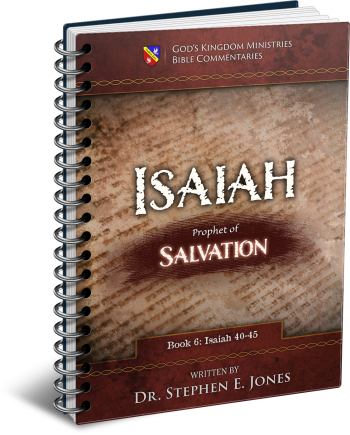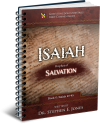Latest Posts
View the latest posts in an easy-to-read list format, with filtering options.

Isaiah is the prophet of Salvation. He is also known as the truly "Universalist" prophet, by which is meant that He makes it clear that salvation is extended equally to all nations and not just to Israel. He lived to see the fall of Israel and the deportation of the Israelites to Assyria, and he prophesied of their "return" to God (through repentance). He is truly a "major prophet" whose prophecies greatly influenced the Apostle Paul in the New Testament.
Category - Bible Commentaries

The book of Isaiah divides naturally into two main parts. Isaiah 1-39 is part one, showing us the failure of Israel and Judah to fulfill their Old Covenant vow. Isaiah 40-66 shows us the ultimate success of God’s New Covenant vow, or promise. Hence, the first half of Isaiah portrays a sin-sick people being threatened with divine judgment, and it concludes dismally with a promise of exile to Babylon.
Chapter 40 opens a new page with renewed hope, based upon the work of the Holy Spirit, which was sent to ensure God’s success in fulfilling His promise in spite of man’s failure.
Critics have long used this natural division in the book in order to discredit the author (and Author). Many maintain that the book was written by two different men (First and Second Isaiah), when, in fact, were we to cede that point, it would hardly matter, because our faith is in the fact that God Himself authored the entire book, using men as mere agents of truth.
But I do not believe in the two-author theory. I do not believe that so-called “First Isaiah” was a prophet of doom, while “Second Isaiah” contradicted him with prophecies of comfort. I believe that Isaiah was a prophet of universal salvation and understood the New Covenant while writing the entire book. His message changed when it was appropriate for a new season of prophecy.
The difference is that in the first half of the book, the prophet was inspired to emphasize the Old Covenant aspect of truth, which could only bring the nations to an end. The latter half of the book brings the New Covenant into full view, while the judgments of God come to an end by God’s mercy and love.
It is self-evident that under the Old Covenant God requires repentance in order to be saved. Some do not realize that repentance is also required under the New Covenant. The difference is that the Old Covenant burdens men with the responsibility to repent by the power of their own will; the New Covenant puts the burden upon God to cause men to repent, so that they can be saved.
Whoever makes the vow is responsible to fulfill its terms.
Under the Old Covenant, the question is whether or not men would be obedient, or, having sinned, would repent for their disobedience. Scripture shows that the nation often repented, yet over time, the rot continued. If it were not for an overcoming remnant, the nation would disintegrate entirely. For this reason, Isaiah, the Prophet of Salvation, shows in the first half of his book that salvation cannot be obtained through the Old Covenant.
Under the New Covenant, the question is whether or not God Himself is capable of fulfilling His promises. Is His will powerful enough to overcome the will of men and cause them to repent so that they may be saved? Is God’s sovereignty more powerful than man’s authority? Is the role of the Holy Spirit limited to assisting man in fulfilling his Old Covenant vow? Or does the Holy Spirit have the power to change the will and heart of man in order to fulfill God’s New Covenant vow to save all mankind? Is God a coach playing under an Old Covenant rule book, or is He a king whose New Covenant word creates reality and prevails in the end?
We are given hints in the first half of the book, but in the last half the prophet boldly proclaims the answer.
Isaiah 40:1 begins,
1 “Comfort, O comfort My people,” says your God.
The Hebrew word for “comfort” is nacham, and this establishes the Hebrew concept of the Holy Spirit acting as a “Comforter” in John 14:26, KJV,
26 But the Comforter, which is the Holy Ghost, whom the Father will send in My name, He shall teach you all things and bring all things to your remembrance, whatsoever I have said to you.
In a family setting, a comforter is one who brings comfort, especially to a child. Hence, Jesus said in John 14:18, KJV, “I will not leave you comfortless.” The NASB renders this, “I will not leave you as orphans.” The concept is rooted in the concept of the so-called kinsman redeemer, often mistranslated as “avenger of blood.” The head of the family was responsible to bring justice where needed and to represent family members in a court of law. Orphans were often taken in and put under the protection of his covering.
A “comforter” is an advocate in a court of law which helps and instructs people in the law so that they can make their case before the judge. Jesus said that the Holy Spirit is our Comforter.
More than that, the Hebrew word literally means “to breathe forcibly.” In a sense, it is like a sigh or the hard breathing while giving birth. There is a sense of pity and concern in this word. It is the desire to bring rectification, relief, correction, and a just solution to a problem. Hence, Jesus “breathed” on His disciples to impart to them the Holy Spirit (John 20:22).
The kinsman redeemer actually had two duties. If guilty, a family member needed correction and thus he should repent and submit to divine judgment. If innocent, evidence should be brought forward to clear his name. So there were two words (homonyms) that described these distinct situations: nacham and naqam.
Nacham described “comfort” in the positive sense, while naqam was the “vengeance” of divine judgment. Nacham was designed to acquit the innocent, while naqam was designed to restore the sinner back to a place of forgiveness and honor, usually through restitution payment—or, in more serious cases, working off one’s debt (slavery).
A kinsman redeemer was a comforter, that is, a nacham, whose responsibility was to defend family members from being victims of crime. If the family member was the guilty party, he was not required to side with a sinner. He was first and foremost a servant of God, and this required him to serve the cause of justice, regardless of family ties. His primary responsibility was to see that justice was done in order to satisfy the law, redeem the sinner, and restore the rights of the victim.
Paul tells us in Rom. 12:19,
19 Never take your own revenge, beloved, but leave room for the wrath of God, for it is written [in Deut. 32:35], “Vengeance is Mine, I will repay,” says the Lord.
Paul quoted Deut. 32:35, where the Hebrew word for “vengeance” is naqam. Paul’s command was given because men’s vengeance is unlike God’s vengeance.
Men are motivated by self-interest and their emotions color their judgments. Their intent, more often than not, is to punish rather than to correct and restore. They often show misplaced loyalty by siding with their own tribe or family members who have sinned.
Many Christians misunderstand Paul’s admonition because they think God’s “vengeance” is far more painful than man’s vengeance. In fact, God’s vengeance is designed to restore sinners, so that God may be “all in all” (1 Cor. 15:28). Man’s vengeance is often too lenient for family members and too cruel for those outside the family.
In other words, the problem is that man’s vengeance usually lacks the restorative purpose that is the basis of God’s justice. Man tends to be partial in his ways; God is an impartial Judge. That is why we are to “leave room for the wrath of God.”
The role of the Holy Spirit, then, is not only to bring comfort but to “convict the world concerning sin” (John 16:8). The Holy Spirit does not set aside justice but uses justice to correct and restore sinners. This is the only lawful way that God can fulfill His vow to save the world without going against His own nature. He must be true to Himself.
Isaiah 40:2 says,
2 “Speak kindly [leb, “heart”] to Jerusalem, and call out to her, that her warfare has ended, that her iniquity has been removed, that she has received of the Lord’s hand double for all her sins.”
The work of the Comforter is to speak to the heart. So the Holy Spirit was not sent merely to change one’s behavior but to change one’s heart, nature, and will. The word of the Holy Spirit is to proclaim that “her warfare has ended.” So Paul tells us in 2 Cor. 5:18, 19,
18 Now all these things are from God, who reconciled us to Himself through Christ and gave us the ministry of reconciliation, 19 namely, that God was in Christ reconciling the world to Himself, not counting their trespasses against them, and He has committed to us the word of reconciliation.
The word (message) of reconciliation is that God is not fighting against the world. The message is not a threat but one of reconciliation. An Old Covenant message threatens men with divine judgment for not following Christ; a New Covenant message presents the good news that God Himself intends to fulfill His promise to save the world.
Isaiah tells us that Jerusalem “has received of the Lord’s hand double for all her sins.” This is a reference to the law of restitution in Exodus 22:4, which says that a thief must “pay double” to his victim. So God required men in general and Jerusalem in particular to pay double restitution for their sins.
Mystery Babylon, too, is required to pay double (Rev. 18:6). The law of our impartial God is the same for everyone, because God’s nature is unchanging. His law is an expression of His own nature and is not influenced by any man.
When a sinner’s sentence is completed, he is to be released by the good news that his time of slavery is accomplished. He is no longer “under the law” but “under grace.” The debt to sin has been paid, and the law has no more reason to enslave him. The same law that had enslaved him now gives him grace.